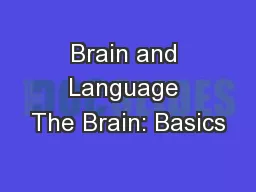PPT-GET TO KNOW THE BASICS OF BRAIN INJURY FROM
Author : christina | Published Date : 2022-02-15
OPIOID OVERDOSE Presentation for Healthcare Professionals and First Responders provided by the NH Providers Association What is Brain Injury from Opioid Overdose
Presentation Embed Code
Download Presentation
Download Presentation The PPT/PDF document "GET TO KNOW THE BASICS OF BRAIN INJURY ..." is the property of its rightful owner. Permission is granted to download and print the materials on this website for personal, non-commercial use only, and to display it on your personal computer provided you do not modify the materials and that you retain all copyright notices contained in the materials. By downloading content from our website, you accept the terms of this agreement.
GET TO KNOW THE BASICS OF BRAIN INJURY FROM: Transcript
Download Rules Of Document
"GET TO KNOW THE BASICS OF BRAIN INJURY FROM"The content belongs to its owner. You may download and print it for personal use, without modification, and keep all copyright notices. By downloading, you agree to these terms.
Related Documents














